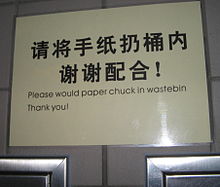Engrish
From Wikipedia, the free encyclopedia
|
This article or section has multiple issues. Please help improve the article or discuss these issues on the talk page.
|
| The examples and perspective in this article may not include all significant viewpoints. Please improve the article or discuss the issue on the talk page. (November 2008) |
| This article includes a list of references or external links, but its sources remain unclear because it has insufficient inline citations. Please help to improve this article by introducing more precise citations where appropriate. (December 2008) |
| This article contains Japanese text. Without proper rendering support, you may see question marks, boxes, or other symbols instead of kanji and kana. |

Engrish refers to non-standard variations of English often found in East Asian countries. Spelling may also be non-standard. While the term may refer to spoken English, it is more often used to describe written English, for which problems are easier to identify and publicize. The term arises from an ambiguity between the "r" and "l" sounds in the spoken Japanese language, although the Chinese language frequently sees the "l" substituted for "r" in foreign loanwords. Engrish has been found on everything from poorly translated signs, menus, and instruction manuals to bizarrely worded advertisements and strange t-shirt slogans. Usage of the term ranges from the humorous to the pejorative. Country-specific terms, such as Japlish or Janglish for Japan, Konglish for Korea, and Chinglish for China also exist. Although Filipino pronunciation of English words sometimes qualifies as Engrish, the communication style commonly known as Taglish refers instead to the widespread habit of mixing English and Tagalog words and phrases, often using both in one sentence in a process known as code-switching.
Contents |
[edit] History
The term originates from the fact that the Japanese language (as well as several other East Asian languages) supposedly does not have separate sounds for R and L. In Japanese, the R sound is pronounced as an alveolar lateral flap (ɺ), articulated with the tongue flapped against the hard palate behind the front teeth, so that it sounds like a Spanish soft R. Because the Japanese language does not have a separate equivalent for the English L, native Japanese speakers not fluent in English are often unable to distinguish between the R and L sounds.[1] Thus they often mispronounce English words containing the letter L. While the term plays on the accent, it is used mainly without malice in reference to humorous misuses, puns, double entendres, and unintentional word substitutions within written English, not difficulties in pronunciation. For example, "election" might be pronounced similar to "erection", and "clap" might be pronounced like "crap".
A similar problem exists in Chinese. Although Mandarin Chinese has two separate sounds transcribed as 'l' and 'r' in Pinyin, the 'r' sound at the beginning of a syllable often sounds more like 'zh' (technically, a voiced retroflex fricative) and is not considered appropriate for rendering foreign 'r' sounds; conversely, no syllables end in 'l'. Hence, both 'l' and 'r' will be rendered in Chinese as 'l' at the beginning of a syllable and 'r' at the end of a syllable -- for example, Donald Rumsfeld's last name is rendered Lāmǔsīfēi'ěrdé [[1]]. As a result, Chinese speakers often mix up 'l' and 'r' when writing, and hence pronouncing, foreign words.
[edit] Japlish
- See also Gairaigo.

Engrish can also refer to the Japanese pronunciation of English loanwords or a Japanese dialect with a number of English loanwords. Because Japanese has only five vowels, and few consonant clusters, English loanwords are often pronounced in a manner that sounds unusual and even humorous to English speakers. For example, in spoken Japanese, guitarist Eric Clapton becomes エリック・クラプトン Erikku Kuraputon, Australia becomes オーストラリア Ōsutoraria, and "McDonald's" becomes マクドナルド Makudonarudo, which is often further abbreviated to マクド Makudo or マック Makku. Japanese uses over 600 imported English words in common speech, sometimes in abbreviated form. Examples are ハンカチ hankachi for "handkerchief", フォーク fōku for "fork", テーブル tēburu for "table", プロレス puroresu for "pro wrestling", and so on. The more outlandish and humorous the pronunciation change is, the more likely it is to be considered Engrish. Even fairly logical English loanwords in Japanese will often sound foreign and unintelligible to an English speaker. These pronunciation changes are linguistically systematic.
In Japanese, specifically, some words are carried over from English, but are used in a changed context. For example, an electrical outlet in Japanese is referred to as コンセント (konsento), modeled after the archaic term "concentric plug" which actually refers to the connector that is inserted into the outlet. In another example, a small plastic water or soda bottle is referred to in Japan as a "petto bottoru," or "PET bottle"; "PET" is the abbreviation for polyethylene terephthalate, the type of plastic of which the bottles are made. This often causes confusion among listeners of native Japanese speakers, as the terms are not widely known in English.
Engrish was once a frequent occurrence in consumer electronics product manuals, with phrases such as "to make speed up find up out document", or "Gas is maybe poison is" (for "Gases may be poisonous"), but it is less frequent today. Another source of poor translation is unchecked machine translation, such as that from the Babelfish service or Google Language Tools. Engrish is often created by using round-trip translation, wherein a phrase is translated using the Babelfish service or Google Language Tools into Japanese, then copying and pasting the Japanese text and translating it back into English.
[edit] Pop culture
Engrish features prominently in Japanese pop culture. Japanese has assimilated a great deal of vocabulary from the English language, and many popular Japanese songs and television themes feature disjointed phrases in English amongst the otherwise Japanese lyrics. Japanese marketing firms helped to create this popularity, and have subsequently created an enormous array of advertisements, products, and clothing marked with English phrases that seem highly amusing or inexplicably bizarre to those proficient in English. These new English terms are generally short-lived, as they are used more fashionably than meaningfully. Many times English is just used in advertising or on products as an attempt to look modern and is not actually an attempt to communicate. Engrish was often in many old video games from poor translation. One well-known and popular example of Engrish in pop culture is the All your base are belong to us video game translation phenomenon. Well-known fictitious uses of Engrish include NewsRadio episode "Super Karate Monkey Death Car," wherein Jimmy James is forced to publicly read his autobiography after it had been published in Japanese and translated into English. Another example is the song "Let's Fighting Love", used occasionally on the Comedy Central series South Park to satirize badly-translated anime shows.
Most recently, Engrish has been the central feature of the internet video series Gorgeous Tiny Chicken Machine Show.
[edit] Nihonglish
In contrast to Engrish, the term Nihonglish is occasionally heard, as well as the variant 英本語 Eihongo, a combination of 英語 Eigo, the Japanese word for the English language, and 日本語 Nihongo, the Japanese word for the Japanese language. It refers to the conceptual opposite of Engrish: badly pronounced and ungrammatical Japanese produced by a native English speaker. A typical example is the American English pronunciation of こんにちは konnichiwa ("hello", "good day"); rendered with an English stress pattern and phonetics as IPA: /kəˈniːtʃiwɑː/ instead of the Japanese pronunciation IPA: [ko↑nnʲitɕiɰa]. The term Nihonglish is often found among communities of Japanese language students where Japanese can be used sporadically in English conversation much as English is used among English students in Japan. The use of Nihonglish is usually intentional, and is done with a humorous or sarcastic intent. A heavy English accent is used, indicating supposed unfamiliarity with the rules of Japanese pronunciation. It is also known for being practiced occasionally by some non-Japanese fans of Japanese animation; in such cases it is also sometimes referred to as otakuism or Otaku-Speak.
[edit] See also
- Chinglish
- Czenglish
- Denglisch
- Dunglish
- Franglais
- Franponais
- Globish
- Greeklish
- Hinglish
- Hong Kong English
- Janglish
- Konglish
- Manglish
- Poglish
- Runglish
- Singlish
- Spanglish
- Swenglish
- Taglish & Englog
- Tinglish
- Türkilizce
- All your base are belong to us
- Non-native pronunciations of English
- Stereotypes of Asians
- Wasei-eigo Japanese pseudo-Anglicisms
- Wenglish
[edit] Notes
- ^ S. Pinker, The Language Instinct, p. 168.
[edit] References
- Yardley, Jim. "No Spitting on the Road to Olympic Glory, Beijing Says". The New York Times, April 16, 2007. Accessed April 17, 2007.
[edit] External links
| Wikimedia Commons has media related to: Engrish |
- http://www.lolengrish.com/ - photos of Engrish from around the world
- http://www.engrish.com/ - photos of Engrish from Japan and elsewhere
- http://www.tage3.com/english/index.php - photos of Engrish from the Arabic world
- http://www.mikesblender.com/japangrish.htm - photos of Engrish from Japan
- http://www.fahruz.org/ - examples of Engrish and similar portmanteaux
- Engrish on enaajia.com
- Engrish on rinkworks.com - written examples
- Engrish on tiptonium.com - examples from video games
- Hanzi Smatter (一知半解) - The reverse of Engrish (misuse of Chinese characters)
- Engrish generator - on pigeond.net
- News in Engrish - Summaries of the latest news headlines, translated into Engrish




